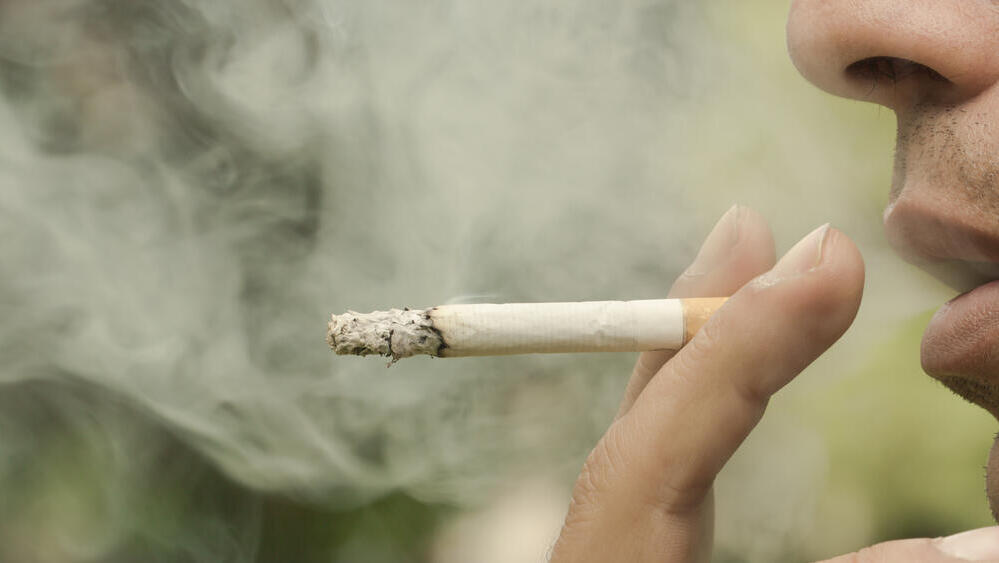Getting your Trinity Audio player ready...
Are you suffering from secondhand smoke from your neighbors' cigarettes? You're not alone: A recent study conducted by the School of Public Health at Tel Aviv University reveals that nearly half of the population in Israel suffers from passive smoking due to the infiltration of smoke into their homes, primarily from neighbors' smoking.
Read more:
According to the research, only a quarter of those affected by secondhand smoke will complain to their smoking neighbors or housing committees. Following the report, a petition has been submitted to the Supreme Court against government ministries for not taking action to prevent public harm from the infiltration of passive smoking from neighbors who smoke on balconies, windows, inside homes and in residential yards.
2 View gallery


Only a quarter of those affected by secondhand smoke will complain to their smoking neighbors or housing committees
(Photo: Shutterstock)
Led by Professor Leah Rosen, along with student Noa Theitler, and in collaboration with Dr. Maya Peled-Raz from the University of Haifa, Dr. Michal Bitan from the Academic College of Management, and Dr. Vaughan W. Rees from Harvard University, the research was recently published in the Israel Journal of Health Policy Research.
This study is the third in a series of research projects focused on passive smoking. In the first study, published two years ago, the research team examined the presence of nicotine remnants in children exposed to smoking parents, revealing that 70% of children with smoking parents were exposed to passive smoking. Subsequently, the researchers investigated the presence of nicotine remnants in the hair of children with parents who restricted smoking to balconies or outside the home. The findings were also alarming: nicotine remnants were found in the hair of six out of every 10 children.
The new study completes the picture and highlights a widespread phenomenon. It reveals that almost half of the families in Israel suffer from passive smoking infiltration into their homes, primarily from neighbors who smoke, and most of these families do not complain about it.
2 View gallery


The law does not prohibit smoking on balconies or near windows adjacent to other apartments
( Photo: Shutterstock)
The study encompassed approximately 300 participants from across the country who were surveyed in 2017 regarding their experience and perception of cigarette smoke infiltration from outside into their homes. Around 45% of respondents reported experiencing such smoke infiltration, with residents of shared buildings being 3.6 times more likely to be affected compared to those in private houses.
Participants were also asked whether neighbors have the right to smoke on their balconies, even if it negatively affects others, or whether residents have the right to breathe clean air. Some 70% stated that the right to breathe clean air outweighs the smoker's right to smoke on their balcony. Additionally, nearly 50% of smokers agreed that individuals have the right to breathe clean air within their homes.
"Many participants indicated that smoke bothers them significantly and they are concerned about its impact on their health. However, due to social norms and good relationships with neighbors, they prefer to avoid conflicts and refrain from complaining," says Rosen. "Unfortunately, there were cases where citizens testified that they were forced to move to a new residence due to incessant smoke intrusion from neighbors."
These findings shed light on the delicate balance between personal comfort and neighborly relations, highlighting the need for better awareness and communication to address the issue of passive smoking.
 Prof. Leah RosenPhoto: Tel Aviv University
Prof. Leah RosenPhoto: Tel Aviv UniversityCurrently, Israeli law prohibits smoking within a distance of 10 meters from public places such as hospitals and schools. However, the law does not prohibit smoking on balconies or near windows adjacent to other apartments.
"This is an absurd situation that endangers the public, as it remains unaddressed in the face of a growing phenomenon," says Rosen. "There is no safe level of exposure to tobacco smoke, and even brief and minimal exposure can cause significant harm, including asthma attacks and heart attacks. Since smoke from a single cigarette can travel up to nine meters in the open air, the high density of apartments in shared buildings allows the smoke to infiltrate the neighboring homes and impact their health."
Currently, the Supreme Court is deliberating an appeal filed by the Clean Air Association and six citizens. The appeal asserts that the ministries have failed to protect public health from passive smoking infiltrating homes. According to the appellants, the exposure to a neighbor's smoke has greatly harmed them, and they demand that the government regulate this issue.
The ongoing legal proceedings underscore the urgency of addressing passive smoking concerns and implementing measures to safeguard public health from the risks associated with secondhand smoke infiltration.
"Our article assesses the scope of the problem in Israel and the fact that sometimes people are even forced to leave their homes due to it. The fact that nearly half of the population has suffered from this issue indicates that it's not just a local neighborly dispute, but a very widespread problem that requires government intervention. If the appellants' position is upheld by the Supreme Court, it could protect millions of Israelis from the harmful effects of tobacco smoke infiltrating their homes," emphasizes Rosen.


